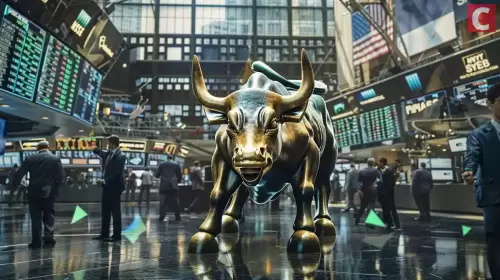Exploring the trend of 'coin-stock linkage' where listed companies buy crypto to boost market value, and whether this strategy offers long-term benefits or just short-term gains.

In the wild world of Wall Street, a new trend has emerged: 'Coin-stock linkage.' Listed companies are diving into the crypto market, hoping to pump up their market value. But is this strategy a stroke of genius or just a fleeting fad? Let's break it down.
The Allure of 'Buying Coins'
The basic idea is simple: companies add crypto assets like Bitcoin to their balance sheets, and the market goes wild, slapping on a premium valuation. It's like a magic trick where holding crypto assets transforms a company's perceived worth. The logic? Investors get excited about the potential for 'coin price increases,' which theoretically boosts the company's overall value.
Short-Term Boost, Long-Term Question Marks
No doubt, this strategy can create short-term buzz. Take Cango, an auto trading service provider. When they announced their entry into Bitcoin mining and spent $400 million on computing power, their stock price skyrocketed by 280%. But the real question is: can this enthusiasm translate into sustainable growth?
The data tells a mixed story. While some companies see an initial surge after buying coins, many face a stock price correction if they don't keep buying or announce more positive news. The market is quick to reward the initial move but equally quick to lose interest.
Are the Big Players Cashing Out?
Interestingly, some of the early believers in this strategy seem to be taking profits. Strategy, the company that championed the 'unlimited growth' theory, has been selling off shares of $MSTR. Similarly, Upexi, dubbed the 'Sol version of MicroStrategy,' recently plunged as investors prepared to sell a massive chunk of shares. Even Ark Invest, a major supporter of Circle (the stablecoin issuer), has been reducing its holdings.
The Bottom Line
Buying coins can be a tempting way for listed companies to boost market value. However, relying on crypto assets to enhance market value might be a short-sighted strategy. External factors, such as geopolitical tensions and political caution can significantly impact crypto investors’ risk appetite. Bitcoin, for instance, experienced a notable drop in early June due to announcements of new tariffs and trade agreement accusations.
At the end of the day, the market will eventually demand more than just a crypto portfolio. Growth, profitability, and solid business operations will always matter. Buying orders in the secondary market are not necessarily recognition; it is more likely to be the rotation of chips for short-term speculation.
Final Thoughts
So, is 'coin-stock linkage' the future of finance? Maybe, maybe not. It's a fascinating experiment, but companies need to remember that lasting value comes from building a strong business, not just riding the crypto wave. Now, if you'll excuse me, I'm off to check my own crypto portfolio...just in case!











































































